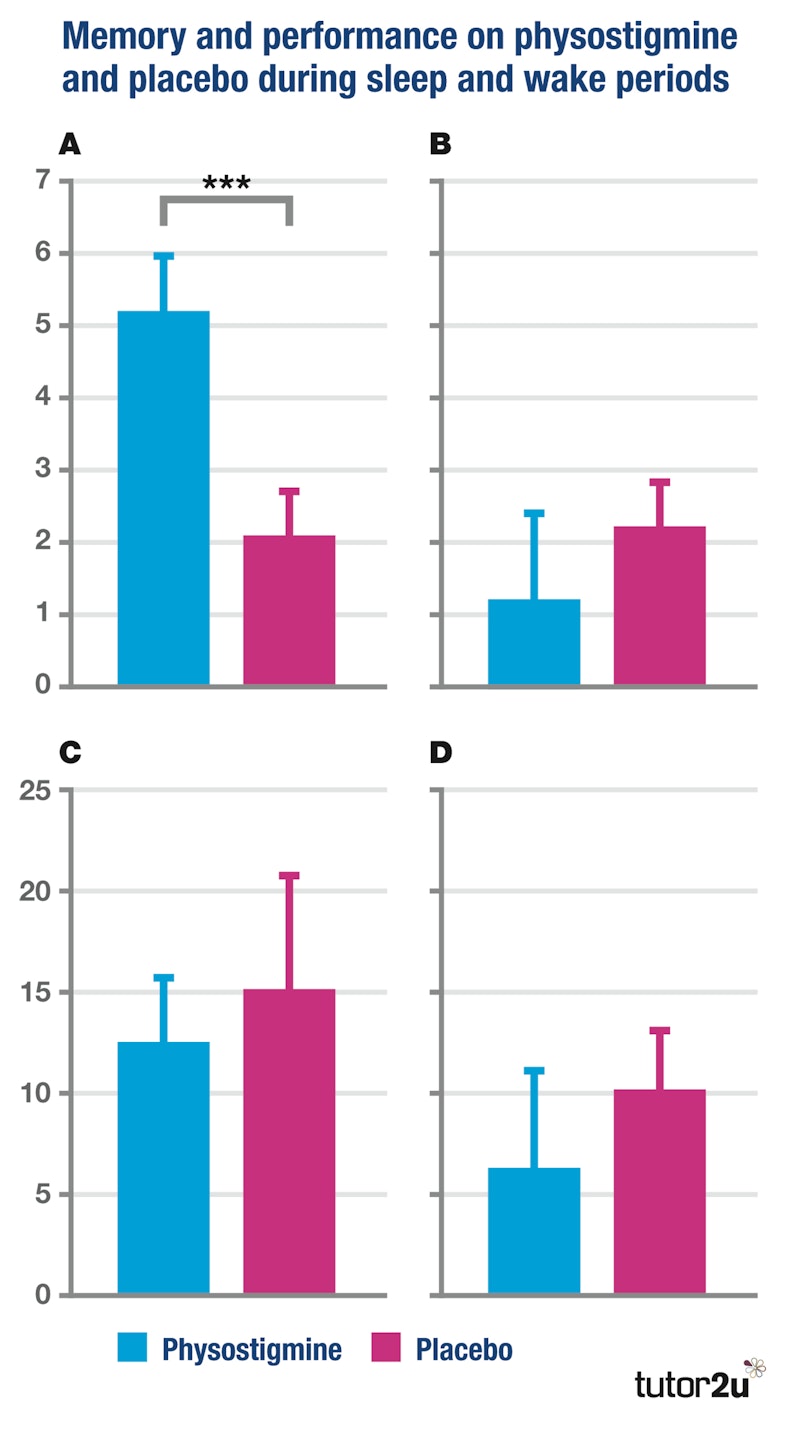Study Notes
Gais and Born (2004)
- Level:
- AS, A-Level, IB
- Board:
- AQA, Edexcel, OCR, IB, Eduqas, WJEC
Last updated 22 Mar 2021
Low acetylcholine during slow-wave sleep is critical for declarative memory consolidation.
Background information: The researchers were interested in the role of acetylcholine in the hippocampus during slow-wave sleep. Acetylcholine is raised when we are awake and active, but in order to consolidate memories of what has happened in the day, researchers are aware through studies using rats that deep sleep is needed. Therefore the role of acetylcholine in the processing of these memories while we are asleep was investigated, using humans.
Aim: To investigate the levels of acetylcholine in the human hippocampus while a person is in slow-wave sleep.
Method: Twenty-nine healthy male participants aged between 18 and 35 years old engaged in one adaptation night and two experimental nights. They were split into two groups, and all participants in both groups completed a word memory task (declarative/explicit memory) and a mirror-image tracing task (non-declarative/implicit memory) between 10 and 10.30pm. On the first night, beginning with sleep onset (sleep experiment) or at 11:15 p.m. (wake control experiment), subjects received an infusion of physostigmine, which stimulates acetylcholine production, over two hours. On the second night, all participants received a placebo (saline solution).
The experimental “sleep” group were awoken 3 hours after falling asleep and asked to recall the words they remembered and to complete the tracing task. The control group stayed awake, and they were asked at the same time as the experimental group to recall their words, and to complete the tracing task.

Results: During sleep, memory for the declarative wordlist task distinctly decreased after administration of physostigmine as compared with placebo. In the wake condition the elevation of acetylcholine did not result in decreased memory performance but in an insignificant increase in wordlist recall as compared with that in the placebo condition.
On the other hand, neither speed nor accuracy in the non-declarative mirror-tracing task decreased after physostigmine administration in either the experimental or control conditions.
Conclusion: Acquisition of declarative information (learning and memory for events) when we are awake needs the higher acetylcholine levels that have been noted in previous experiments with rats. However, the processing and storage of the materials into neocortical networks require a period of low acetylcholine levels to prevent suppression of feedback from the hippocampus to the other areas of the brain. So, high acetylcholine is needed for information to be retained in the hippocampus, and low acetylcholine is needed for that information to enter long-term memory.
Evaluation:
Strengths: As the researchers themselves note, this is a logical conclusion from the earlier rat studies and their own research. Acetylcholine levels seem to mediate the direction of information flow.
Limitations: However, this was a small experiment on males only and therefore has gender bias. Also, there was a limited age range of the participants (between 18 and 35 years old) and the experiment needs to be repeated with older participants, and with a gender balance and a mixture of ethnicities in order that the results may be replicated and the reliability of this experiment established.
Ethically, as physostigmine can have unpleasant side-effects, there was a small risk of physical harm and mental stress being caused to participants.
Some critics have suggested that the amount of short-wave sleep is relevant, but the researchers found that memory was only impaired with an extreme lack of sleep, and not improved if the amount of sleep was increased from average to longer.
These findings could have a useful application in Alzheimer’s patients, as drugs which block acetylcholine in the brain could be used to decrease the amount of acetylcholine during sleep, and so aid memory consolidation.For More Study Notes…
To keep up-to-date with the tutor2u Psychology team, follow us on Twitter @tutor2uPsych, Facebook AQA / OCR / Edexcel / Student or subscribe to the Psychology Daily Digest and get new content delivered to your inbox!
You might also like
Explanations for Conformity
Study Notes
Cultural Variations in Attachment
Study Notes
Introspection & the Cognitive Approach
Study Notes
Fadda et al. (1996)
Study Notes
Kohlberg (1968)
Study Notes
Schizophrenia: What is Schizophrenia?
Study Notes